- Home
- Jacob Peppers
A Warrior's Burden: Book One of Saga of the Known Lands
A Warrior's Burden: Book One of Saga of the Known Lands Read online
Contents
Copyright
Dedication
Newsletter Signup
CHAPTER ONE
CHAPTER TWO
CHAPTER THREE
CHAPTER FOUR
CHAPTER FIVE
CHAPTER SIX
CHAPTER SEVEN
CHAPTER EIGHT
CHAPTER NINE
CHAPTER TEN
CHAPTER ELEVEN
CHAPTER TWELVE
CHAPTER THIRTEEN
CHAPTER FOURTEEN
CHAPTER FIFTEEN
CHAPTER SIXTEEN
CHAPTER SEVENTEEN
CHAPTER EIGHTEEN
CHAPTER NINETEEN
CHAPTER TWENTY
CHAPTER TWENTY-ONE
CHAPTER TWENTY-TWO
CHAPTER TWENTY-THREE
CHAPTER TWENTY-FOUR
CHAPTER TWENTY-FIVE
CHAPTER TWENTY-SIX
CHAPTER TWENTY-SEVEN
CHAPTER TWENTY-EIGHT
CHAPTER TWENTY-NINE
CHAPTER THIRTY
CHAPTER THIRTY-ONE
CHAPTER THIRTY-TWO
CHAPTER THIRTY-THREE
Give me a shout!
Newsletter Signup
About the Author
Note from the Author
This book is a work of fiction. Names, characters, places and incidents are either the product of the author’s imagination or are used fictitiously. Any resemblance to actual persons, living or dead, or to actual events or locales is entirely coincidental.
A Warrior’s Burden: Saga of the Known Lands Book 1
This ebook is licensed for your personal enjoyment only. This ebook may not be re-sold or given away to other people. If you would like to share this book with another person, please purchase an additional copy for each person you share it with. If you’re reading this book and did not purchase it, or it was not purchased for your use only, then you should return to the retailer and purchase your own copy. Thank you for respecting the hard work of the author.
Copyright © 2021 Jacob Nathaniel Peppers. All rights reserved, including the right to reproduce this book, or portions thereof, in any form. No part of this text may be reproduced, transmitted, downloaded, decompiled, reverse engineered, or stored in or introduced into any information storage and retrieval system, in any form or by any means, whether electronic or mechanical without the express written permission of the author. The scanning, uploading, and distribution of this book via the Internet or via any other means without the permission of the publisher is illegal and punishable by law. Please purchase only authorized electronic editions, and do not participate in or encourage electronic piracy of copyrighted materials.
The publisher does not have any control over and does not assume any responsibility for author or third-party websites or their content.
Visit the author website: http://www.jacobpeppersauthor.com
For my children, Gabriel and Norah
I have been very lucky in my life, very blessed
But out of all the blessings I’ve received—largely undeserved—
There are none I am more thankful for than the privilege of being your father.
Sign up for the author’s mailing list and, for a limited time, receive a free copy of The Silent Blade: A Seven Virtues Novella.
Click here to get your free book now!
CHAPTER ONE
He was a prince, yes, but that was the least of him.
More, he was a tradesman.
As dedicated to his craft as any smith with hours spent hunched at his labors, his hammer in hand.
Yet, his craft was not to create but to destroy, for his tool was his axe.
And his trade was death.
—Exiled Historian to the Crown, Petran Quinn
The woods were dark and seemed to stretch on forever all around him, the snow a heavy blanket at his feet. The forest was so choked with trees that a man would not have been able to see more than a dozen feet in a straight line, if there had been light. But there was not. None, at least, save for the pale light of the moon overhead, hanging thick and pregnant in the sky. It was full tonight, and that was no good thing.
A full moon meant danger, meant that those things which lurked in the darkness were stronger, their will pressing close against the world. Or so the man had been taught, long ago, while bouncing on his mother’s knee, listening to stories, some of brave warriors meant to engender courage, some of the things they faced, meant to engender caution.
But he was a child no longer. Those days were long passed, and the man was older now than his mother had ever been, older, too, than his father had been on the night when those stories had stopped being only stories, when he had seen, firsthand, the truth of what the darkness held.
He had doubted the stories when he was a child, but the man he had become doubted no longer. The bogeymen of his mother’s stories, the demons and devils about which she had warned him did exist. He knew this.
After all, he had seen them. He had watched, helpless, as they had clawed at the foundations of his life, his world, until it had fallen away beneath him, had sent him plummeting into the darkness.
But even had he been ignorant of the truth, even had he not seen it first hand, he would have known that tonight was a night of danger. He could feel the tingle of it in his hands as he worked them against the cold, could taste it in the breath as it went in and out of his lungs. The air was cool, frigid, and full of anticipation, as if the world was waiting. And what it waited for—what it always waited for—was blood. It waited, but it did not wonder, for the story had been told countless times in countless places, and the conclusion was always the same. It waited for blood. And it would have it.
There in the woods, with the snow falling, its thick blanket muting all sound, with the shadows of the great trees pressing close around him, it seemed to him that he was the only person in the world. There was nothing else. Nothing—save the man and the corpse at his feet.
And the knife, of course. There was always the knife. The man stood for a moment, not appreciating the stillness of the moment—for the man he had become appreciated nothing, no longer remembered how—but acknowledging it as he had so many times before in so many different places. With so many different corpses.
The frost coating his leggings cracked and shifted as he knelt before the corpse. An elk, a large one. The pride of its herd, with wide, powerful horns, and a thick, muscular chest. He had always thought them majestic, proud beasts, but the arrow had stolen more than just its life, had stolen its grace, its beauty, and now it was just a corpse like so many others. The poets wrote of beauty in death, but the poets were fools. Why else try to put into words those things—love, hate, beauty, death—that must only be felt to be understood?
He drew the knife from the leather sheath at his waist, then stopped, staring up at the moon. He sat that way, unmoving, for several minutes, the knife in his hand a familiar weight. Had anyone been there to see him, kneeling there amid that snow-covered landscape, they might have been forgiven for thinking him some statue, a left-over, forgotten remnant from a time long past., and in so many ways, they would have been right. But there was no one there to see.
He was alone. Alone as he had been for many years. As he had been, it sometimes seemed, for his entire life.
He brought the knife to his throat. He didn’t think about doing it, never made the conscious decision, but he did it just the same, and as the weight of the handle was familiar to his fingers, so too was the touch of the blade’s flat, cold edge against his skin. He remained that way for the space of several
breaths, thinking. It was a game he played with himself sometimes. And now, like always, he did not know how it would go, was unsure until finally his breath plumed out in a great white fog, and the blade drifted away from his throat seemingly of its own accord.
He was not left frightened at how close he had come, and his hands did not shake at that understanding. They had, once, but that had been long ago, and even the memory of that fear was buried under a thousand such days as this. A thousand such games.
He was preparing to bring the blade to the elk’s throat, to cut away the membrane there so that he might begin to clean it, when a rustle of movement off to his right somewhere in the trees caught his attention. Any normal beast would have been frightened away by the smell of blood thick in the air, and few from the village would have traveled so far from its borders in the day, even less in the night.
Both of these were true things, but they were not the reason why he spun, the reason why the blade was out of his hand, hurtling through the air before he had even drawn another breath. He knew the knife well, its heft and weight, for he had carried it for years, just as he had long ago memorized every tree of these woods, so long had he stalked beneath them.
Both of these were true things, but they were not the reason why the blade flew so straight, why it found its mark unerringly, as if, from the moment it left his hand, there had been no other possibility. The shadowed figure let out a muffled grunt then collapsed to the ground in a heap. The man, known as Cutter to those of the village, rose from his crouch and stalked toward it.
The man had fallen on his back, and the bow—and the arrow he’d been stringing to it—lay in the snow beside him. The man writhed for a moment, but he did not do so for long, for the knife’s path had been true, and in seconds, the corpse stared up at him with vacant, but somehow accusing eyes.
Dead then, and that was no wonder, for the truth—the one he had spent the last fifteen years of his life trying to forget—was that the man the villagers knew as Cutter was good at killing. It was the only thing he was good at.
He knelt down before the corpse and retrieved his knife, cleaning it on the dead man’s jerkin with several practiced strokes before returning it to its sheath. He leaned forward, meaning to examine the man’s clothes—knowing all too well what he would find—but caught a glimpse of an orange speck of light down in the valley beneath the hill on which he crouched. There for only an instant, then gone.
He told himself it had been no more than a figment of his imagination, for if ever there was a place made for such imaginings, it was the cold, dark, lonesome hilltop. He told himself that. But he did not believe it. He told himself that perhaps that orange flash had been no more than a firefly going past, flickering in the shadows. But that, too, he did not believe.
He rose to his feet once more, turning to stare down into the wooded valley from his vantage point on the hill. At first, there was nothing, only the dark and the stillness. Nothing but the cold and the softly falling snow and the white-coated trees, their shadowed limbs thrust out as if they would claw and rend any who drew too close. There was nothing else, nothing at all.
Until there was.
Another orange flicker, then another. Far away, the sight of it nearly occluded by the shape of the great wooden sentinels in the valley beneath him, but there just the same, and no denying it. He knew what it was, realized that he had known it from the first, no matter how much he may have wished otherwise. Fire. And what’s more—torches.
There were all manner of beasts in the world, each with their own dangers—so his mother had taught him on her knee, many years ago, and his life had taught him no different. But out of all those beasts, none, save one, carried torches, and that one was, perhaps, the most dangerous of all. Men. Men walking in the dead of night, and though they were too far to even guess at numbers, their forms, if forms he saw, no more than shadows among the trees, the light of the torches—several now—were not comforting. Lights that grew in number with each moment that he watched, blooming in the darkness as if by magic. But if magic it was, it was a dark kind.
He felt a familiar stirring at the sight of them, those phantom lights seeming to float through the darkness on their own. A stirring he had not felt in a long time. One he had hoped to never feel again. No merchants, these, for none would be foolish enough to travel this snow-blasted wilderness underneath the gaze of a full moon. No desperate traveler who’d lost his way either, not with so many. That left only one real option—soldiers. And there was only one reason so many soldiers would leave civilization behind to come to this place.
They had finally come. He had known this day would arrive, sooner or later, had known that truth just as he knew the feel of the knife in his hands, the touch of its blade against his throat. He had known that a man could never truly leave his past behind, that it stalked him always, a beast with claws readied, teeth bared. He had known. And yet, he had hoped. But then, the darkness was not a place for hope.
He spared one more glance for those approaching figures, still too distant to make out, then started down the opposite side of the hill. He paused only long enough to retrieve his own bow and quiver from where he’d left them propped against a tree, then set off at a jog, back toward the village of Brighton, toward the place that, for the last fifteen years, had served as his home.
He left the corpse of the elk to lie where it was. It felt wrong to do it, went against his father’s teachings from long ago, for the animal had given its life to provide food that might sustain him and, as such, should have been treated with respect. Dignity. That, instead of being left to rot on a hilltop, any evidence that it had ever existed at all soon to be covered by the thickly-falling snow. Still, he told himself that the gods—if they were even still alive, and the experiences of his life had engendered within him some doubt of that—would understand. After all, if he was right—and he knew he was—the dead beast would have company soon enough.
CHAPTER TWO
Do not ask me what type of man he is,
For I am not sure if he is a man at all.
Certainly, he is more than a man.
Certainly, he is less than one.
—Maeve “The Marvelous” in interview with Exiled Historian to the Crown, Petran Quinn
The common house of the village was filled with the smell of smoke, old and new, and a great, gray cloud parted around him as he stepped inside. An inconvenience, the smoke, one that made his eyes begin to itch and tear up almost immediately, but like so many of life’s inconveniences, it was also necessary. This far north, on the very edge of the Known Lands, there were no seasons, not truly. There was only cold and colder, and even the warmest of days was far below freezing, cold enough that the unprepared could succumb to exposure within an hour of stepping outside.
Not that such a thing happened often. Those hundred or so people who lived in the village of Brighton had long since learned to be prepared, had buried enough dead to know the importance of it. Freezing temperatures, blizzards, Fey raiding parties from the Black Wood, the villagers had weathered them all, survived them all to come out the other side. A little more battered each time, a little more scarred, and with losses to grieve, but alive. Their lives were, mostly, lives of preparation. Preparing for the inevitable winter storms, preparing for Fey raids or the sickness—chills and fevers—that the cold sometimes brought. They were prepared for nearly everything.
And yet, they were not prepared for what was coming.
He closed the door behind him, forcing it shut against the freezing wind that seemed to cut through a man as quick as a blade. By the time the thing was accomplished, there was a pile of snow within the common room, blown in during those few seconds it had taken him.
He turned and walked to stand in front of the thick, oak table at the center of the room, one hewn from two large trees. No more than two, for such a thing was not done, caused jealousy between the spirits of the trees and put a curse on those who used the product of it. O
r so the old ways taught. And here, in this forgotten village, in this frozen wilderness, men and women still listened to the old ways.
“Cutter.”
He looked away from his boots, sodden with snow and specked with the dead man’s blood, bringing his gaze up to the six people seated behind the long table. All old—or, at least, as old as such a place as Brighton saw—and all of them watching him. Three men and three women, as was custom. Five had been the village elders since he had first come to Brighton what felt like a lifetime ago…or no, that wasn’t right. He shared little in common with that man who had traveled to this wilderness so long ago, the only thing, perhaps, the desire they both held, a wish to be left alone. And the loneliness, of course, that came to men with such wishes.
The sixth elder was younger than the rest, his mostly-gray hair still peppered here and there with bits of black. He studied Cutter with a sneer he did not try to hide. Cutter rarely saw the elders—or anyone—as he had built his house some distance from the rest of the village, but this one seemed to always be sneering or scowling. “You summoned me,” he said, staring at the woman who had spoken, the eldest—and therefore the leader—of the six who served as the village council.
“It is customary,” said the sneering man, “to kneel when you approach the Elders.”
He shifted his gaze to the elder who’d spoken. “I do not kneel.”
The man looked back to the eldest as if for support, but she stared at him impassively before turning back. “Our scouts have just returned. You were right—there’s a significant force coming to Brighton.”
She waited, as if she expected him to say something. When he did not speak, she went on. “They will be here in half a day, no more.”
He glanced up at the hole in the roof, made to allow the smoke of the fires out—a job at which it only partially succeeded—and saw the morning sky. “They will come at night,” he said.

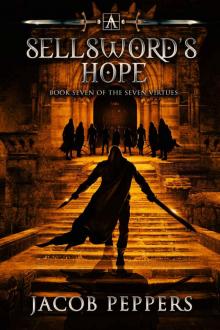 A Sellsword's Hope
A Sellsword's Hope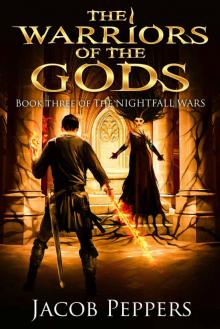 The Warriors of the Gods
The Warriors of the Gods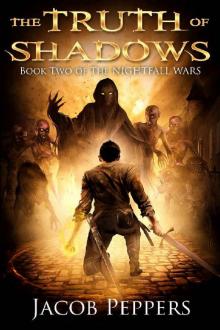 The Truth of Shadows
The Truth of Shadows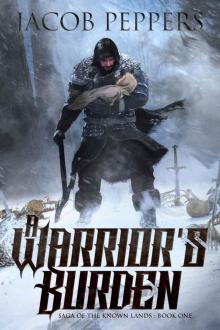 A Warrior's Burden: Book One of Saga of the Known Lands
A Warrior's Burden: Book One of Saga of the Known Lands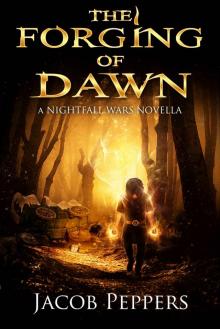 The Forging of Dawn
The Forging of Dawn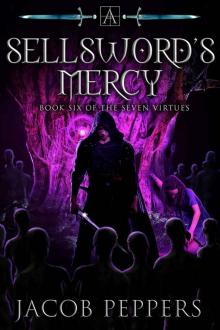 A Sellsword's Mercy
A Sellsword's Mercy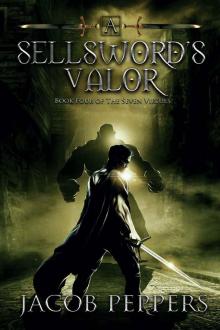 A Sellsword's Valor
A Sellsword's Valor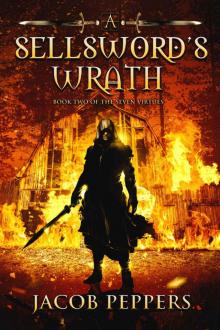 A Sellsword's Wrath
A Sellsword's Wrath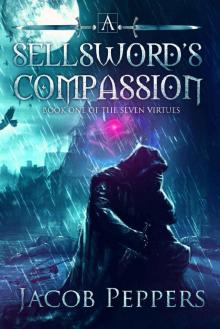 A Sellsword's Compassion_Book One of the Seven Virtues
A Sellsword's Compassion_Book One of the Seven Virtues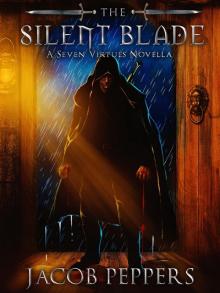 The Silent Blade: A Seven Virtues Novella
The Silent Blade: A Seven Virtues Novella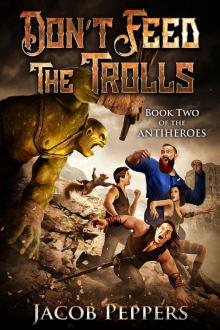 Don't Feed the Trolls
Don't Feed the Trolls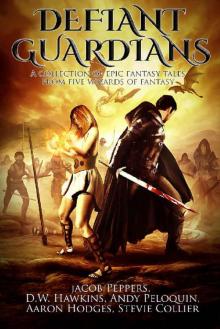 Defiant Guardians Anthology
Defiant Guardians Anthology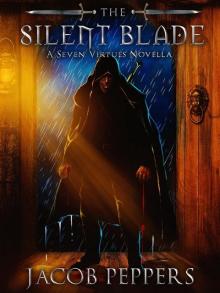 The Silent Blade
The Silent Blade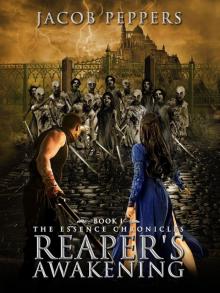 Reaper's Awakening
Reaper's Awakening